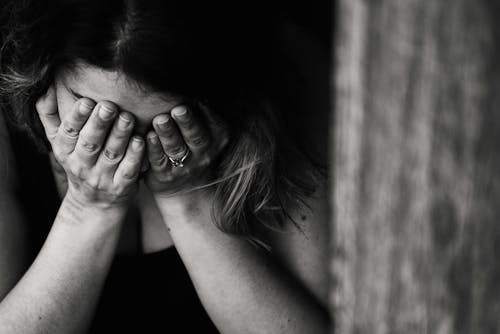Depression

Depression is a serious mental illness. Patients feel very depressed, lose interest, and are exhausted and listless. The disease persists for a long time and usually does not get better on its own without treatment. How do you recognize depression, how does it develop and which therapies help? Read everything important about it here!
Depression often surrounds those affected like a black curtain. But with the right combination of psychotherapy and medication, you can open the curtain again!
Depression: Quick Reference
Symptoms: Main symptoms: Deep depression, loss of interest, listlessness. Side symptoms: i.a. Insomnia, self-doubt, feelings of guilt, difficulty concentratingTherapy: Various forms of psychotherapy and medication (antidepressants)
Causes: Partly genetic predisposition, emotional injuries, disturbed messenger metabolism in the brain, stress
Risk of suicide: 10 to 15 percent of patients commit suicide. Therapy protects
Depression Symptoms
Depression is a serious mental illness that should definitely be treated professionally. Unlike sadness and listlessness, which are part of life, depression does not go away on its own after a while and does not improve through distraction or encouragement.Three main symptoms of depression
How do you recognize depression? The following three main symptoms are typical:Depressed mood: Those affected suffer very much from a deep depression. The depressed mood is almost uninterrupted, strong and lasts for at least two weeks.
Inner emptiness and loss of interests: A characteristic sign of depression is that the person concerned experiences neither joy nor other feelings. Inwardly he feels empty and emotionally dead. The interest in social contacts, in work and hobbies disappears. Attempts to encourage other people have no effect. Even positive experiences do not improve the mood. Everything seems hopeless to them, so that some lose the will to live.
Loss of drive and tiredness: Coping with everyday tasks is difficult or even impossible for depressed people. You feel mentally and physically exhausted all the time. Even getting up in the morning becomes an act of strength, so that some don't even get out of bed because of their depression. Fatigue is becoming the norm.

Side symptoms of depression
The following side symptoms are also typical of depression:- strong self-doubt
- Feelings of guilt and self-blame
- Concentration and attention disorders
- extreme need for sleep or sleep disorders
- severe restlessness and inner excitement
- Loss of sexual interest
- Picture gallery
Depression symptoms in men
Depression is less likely to be diagnosed in men. In part, it's because they often express themselves differently than they do with women with depression. Aggression, severe irritability, poor impulse control, and poor stress tolerance are common side effects. You are taking more risks than usual, for example driving a car far too fast. They also often consume more alcohol than usual or smoke more. They reproach their fellow human beings and are dissatisfied with themselves and the world. One reason could be that they perceive the depressive feelings as weak and unmanly and therefore act out differently.Caution, risk of suicide!
The negative thoughts in severe depression can become so strong that thoughts of suicide arise. Some depressed people have a very high risk of suicide. Approximately ten to fifteen percent of patients with depression die from suicide.Self-test for depression
Do you have the impression that you may be suffering from depression? Online self-tests, such as the renowned Goldberg test, developed by psychiatrist Ivan K. Goldberg, provide important information. Important: Such a self-test cannot replace the diagnosis by a doctor or therapist. Be sure to seek help if the test makes this recommendation.Physical symptoms of depression
Depression is often accompanied by physical complaints that have no apparent organic cause. Such symptoms are called somatic. Typical physical symptoms include:- Cardiovascular complaints
- Headache and backache
- Stomach and intestinal problems,
- sleep disorders
- Loss of appetite
- less often also stronger appetite
- Morning low
- sexual aversion
Somatization disorder
Sometimes the physical complaints are so much in the foreground that the depression is not immediately recognized. Doctors then speak of a somatic syndrome. The physical symptoms appear in phases and subside with the treatment of the depression.If the doctor finds no organic cause for the Complaints, he can reveal the hidden depression as the actual cause by asking carefully. If so, he will diagnose what is known as a somatization disorder. This does not mean that the patient is just imagining the symptoms, but only that the depression is physical.
Delusions and hallucinations in depression
A major depressive episode is sometimes accompanied by delusions and hallucinations. The patients then suffer from paranoia or obsessive thoughts, for example. Such delusional depression is especially difficult to treat. In addition to antidepressants, antipsychotic drugs are also used.Sadness or depression?
Depression symptoms can be similar to those of deep grief. But there are crucial differences. This includes that, in contrast to depression, in a bereavement the depressed mood does not always remain equally strong. Most mourners, despite their loss, are able to laugh and feel joy in between. People with depression cannot do that.In addition, the mood of those who mourn usually improves over time. The grief can come back suddenly through the thought of the loss. But gradually a grieving person will increasingly enjoy beautiful experiences again. The support of friends and family can also be a comfort to him. In some cases, however, a grief response turns into depression.

Depression Treatment
Every third person develops depression in the course of their life, according to statistics. Prompt treatment is then important because those affected suffer greatly from their condition. In addition, therapy becomes more difficult and the risk of the disease becoming chronic increases.Depending on the severity of the illness, depression is usually treated with psychotherapy, antidepressant medication, or a combination of both. Combination therapy is particularly indicated for chronic and recurring depression. Even for severe depression, experts recommend a combination of both treatment approaches.
Psychotherapy for depression
There are many psychotherapeutic offers for people with depression. Currently, however, the health insurers only cover the costs for cognitive behavioral therapy and for so-called psychodynamic psychotherapies.psychotherapy
Psychotherapy requires patience and commitment from the patient over a period of months. But those who get involved can often overcome their depression in the long term and improve their psychological stability overall.Cognitive behavioral therapy
In cognitive behavioral therapy, the patient looks for ways to get out of the depression with the support of the therapist. To this end, negative thoughts, patterns and beliefs are uncovered, checked for correctness and, if necessary, replaced by new, more positive ways of thinking.Psychodynamic psychotherapy
Psychodynamic psychotherapies are based on the idea that depression is often triggered by experiences of loss and illness that could not be processed properly. These should be worked up in the course of therapy. Classical psychoanalysis belongs to psychodynamic psychotherapies as well as psychotherapy based on depth psychology.Other forms of psychotherapy for depression
Interpersonal therapy (IPT) is a short-term therapy method that was specially developed for the treatment of depressive illnesses. It combines therapeutic concepts from behavioral therapy and psychodynamic therapy. An important goal of therapy is to learn skills and strategies for dealing with conflicts that contribute to the development or maintenance of depression.However, the costs for the ITP are not yet covered by the health insurers. This also applies to various other forms of therapy such as systemic therapy, family therapy, gestalt therapy or art therapy. However, they are often offered as supportive therapies as part of inpatient treatment.
This also applies to supplementary therapeutic measures such as psycho-education, occupational therapy, groups of relatives, learning relaxation techniques and body and movement-related therapies.




0 Comments